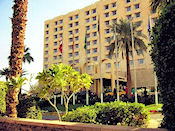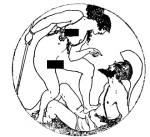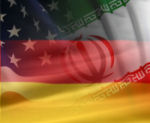
ABOVE: Khartoum Hilton
Yesterday, the Office of Foreign Assets Control (“OFAC”) released its monthly rundown of recent civil penalties. This month’s winner of the coveted highest penalty award goes to Hilton International, a subsidiary of Hilton Worldwide, which agreed to pay $735,407 to OFAC in connection with the chain’s operation of two Hilton hotels in Sudan between June 2002 and February 2006. The alleged violation was self-disclosed by Hilton International in connection with due diligence conducted as part of Hilton’s acquisition, on February 23, 2006, of Hilton Group plc, a British company which, prior to the acquisition, owned and operated all Hilton hotels and resorts outside the United States.
After the disclosure, OFAC alleged that Hilton International had committed 142 violations of the Sudanese Sanctions Regulations. Because Hilton waived the 5-year statute of limitations, the applicable penalty was $11,000 per violation (as opposed to the higher penalty of $250,000 per violation which became effective on October 16, 2007). This meant a maximum penalty of $1,562,000, which OFAC agreed to reduce by slightly more than 50 percent.
The settlement here is about as smelly as, allegedly, the Khartoum Hilton itself. (More, later in this post, on these allegations in unfavorable reviews of the hotel.)
First, during the time period of the alleged violations, the Sudanese hotels were owned and operated by Hilton Group plc, a British company and, more importantly, not a “U.S. person” as defined by the section 538.515 of the Sudanese Sanctions Regulations. Only U.S. persons are subject to the prohibitions of the Sudanese Sanctions Regulations, most notably the prohibition of section 538.205 which forbids the export of goods, technology or services by U.S. persons to Sudan. If Hilton continued to operate the hotels in Sudan after the acquisition in February 2006 of Hilton Group plc, then section 538.205 would apply. But that’s not what is alleged here. There must be something else going on here that isn’t described in the OFAC release to explain why Hilton would agree to such a large fine in this situation.
Even if a violation occurred because of the operation of the hotels by Hilton Group plc, one can only wonder as to how OFAC concocted 142 violations exactly. Since the charges cover a period of approximately three years and 8 months, that’s one violation for each 6.4 days of operation of each hotel. Where did that come from? Why not find a separate violation for each month or year of operation? Heck, why not go for broke and allege that each minute of operation was a separate violation? Although the hotels were alleged to be miserable flea-traps, it’s doubtful that the hotels only had 142 customers or nights of occupancy during the relevant period, so that can’t be the basis for an allegation of exactly 142 violations. Given that the International Emergency Economic Powers Act, which establishes the applicable penalty, doesn’t provide guidance on how to calculate the number of violations here, it seems hard to justify an allegation of any more than two violations, one for each of the Hilton Hotels in Sudan.
On a lighter note, while researching this post I ran across some customer reviews of the Khartoum Hilton which were more than a little harsh and described the hotel as, variously, mosquito-infested, dirty, shabby, run-down, smelly and “grooty,” whatever that is. One highly amusing favorable review could only have been left by the hotel itself:
Hilton Hotel Khartoum is one of the best hotel’s location some gests can get board according to the government regulation and the Legislations , this hotel is good for hunny moons quiet better visit Sudan between Dec-March . for better outdoor activities clean . people are super nice limeted female workers due to culture but guys deliver outstanding services . all nice and Ibelieve its getting better .no hilton has location better than that arround the globe
I don’t know about you, but I’m packing my bags for Khartoum and checking into the Hilton for an extended stay.
 From the London Evening Standard we have this proposal for new sanctions on Iran to deter that country’s nuclear ambitions
From the London Evening Standard we have this proposal for new sanctions on Iran to deter that country’s nuclear ambitions
 Posted by
Posted by  Category:
Category: 

 A court battle raging between Italian company Tiber Aviation s.r.l. and Bell Helicopter Textron Inc. turns on whether Tiber was actually intending to ship a helicopter to Iran or whether Bell told that story to a special agent of the Bureau of Industry and Security (“BIS”) in order to secure the government’s help in repossessing the helicopter. The latest chapter in the saga
A court battle raging between Italian company Tiber Aviation s.r.l. and Bell Helicopter Textron Inc. turns on whether Tiber was actually intending to ship a helicopter to Iran or whether Bell told that story to a special agent of the Bureau of Industry and Security (“BIS”) in order to secure the government’s help in repossessing the helicopter. The latest chapter in the saga  A recent
A recent 
 Last week I
Last week I 

